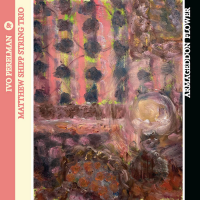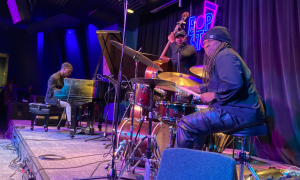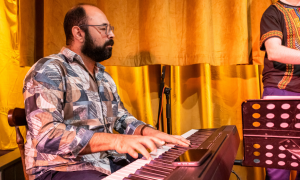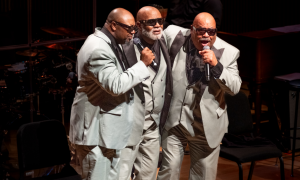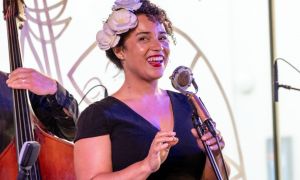Home » Jazz Articles » Live Review » Jazzdor Berlin
Jazzdor Berlin
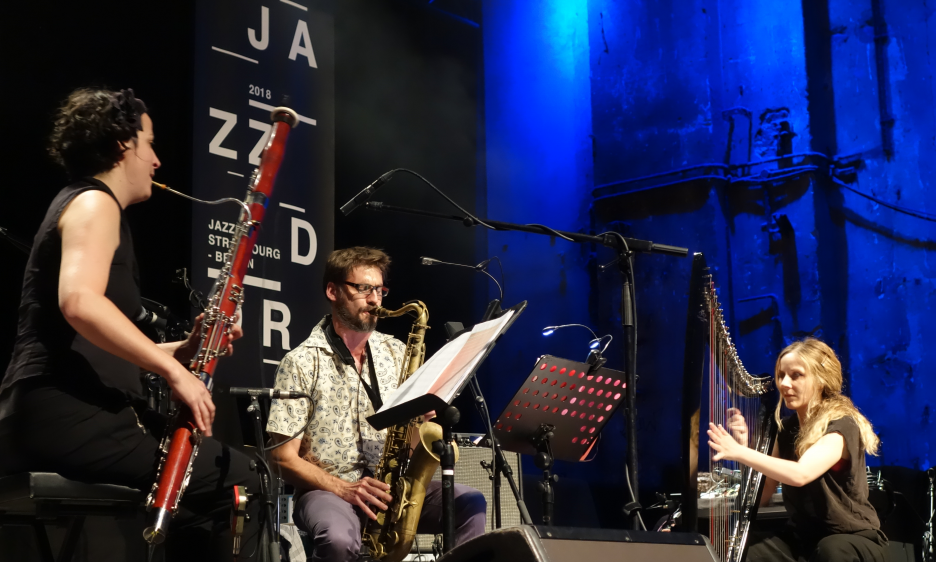
Jazzdor Berlin
June 5-8, 2018
Jazzdor Berlin is a satellite of the Jazzdor Festival of Strasbourg founded 31 years ago. This year's 12th edition of the Franco-German festival held as usual at Kulturbrauerei, an abandoned brewery in Berlin borough Prenzlauer Berg, presented 11 groups with 40 musicians during four nights. Among the 40 musicians were five female musicians: Sophie Bernardo,

Airelle Besson
trumpet
Silke Eberhard
saxophone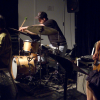
Andrea Parkins
accordionRafaelle Rinaudo
harpThe festival brings bi-or multinational collaborations and introduces new as well as existing French configurations to the Berlin audience in a fine balance of younger and older musicians. Besides the French musicians, this year's edition had nine musicians from Germany, two from Belgium, and one each from Switzerland, Italy and the US. Some artists return in different combinations and constellations, and regularly there are new faces and configurations. This year's edition started with pianist
Roberto Negro
piano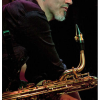 "
data-original-title="" title="">Francois Corneloup's quintet.
"
data-original-title="" title="">Francois Corneloup's quintet. Personal highlights
My personal favorites of this year were a wondrous sound unit of bassoon, harp and saxophone, a surprising and intense pointillist trumpet-piano-drums trinity and an octet with a special twisted charm, vitality and joy of playing the music.The bassoon-saxophone-harp unit of Sophie Bernado,
Hugues Mayot
saxophone, tenorRafaelle Rinaudo
harp
Eve Risser
pianob.1982
Fanny Lasfargues
bass, electricFrench trumpeter Airelle Besson and the topnotch Cologne pianist
Sebastian Sternal
pianoJonas Burgwinkel
drumsThe aforementioned octet is the TransEuropeExpress of renowned Cologne pianist Hans L©╣demann comprising four high-profile German and four French musicians: Silke Eberhard,
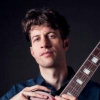
Ronny Graupe
guitar
Dejan Terzic
drums
Théo Ceccaldi
violinb.1986
Yves Robert
tromboneb.1958

Julien Pontvianne
saxophone, tenorAlexandra Grimal
saxophoneThe ensemble has previously played the Jazzdor Festival in 2014 (Berlin) and in 2015 (Strasbourg). Its first album, aptly entitled Polyjazz, was recently released by renowned Budapest BMC label. The music opens a new chapter of multiform interweaving, collaging and intertwining of heterogeneous approaches and ways of entering, different layers, voices and ensemble parts in playful competition with each other.
As such it appeared to be much more open, light and more flexible and permeable than former tightly defined and directed attempts. Pointed titles of pieces, composed by members of the ensemble, such as "Zwickm©╣hle" (L©╣demann), "Traum im Traum" (Terzic), "Schwarz in Weiss" (L©╣demann), "Des Arbres sous les pieds"(Robert) and "Trois fois rien"/"Nichts und wieder nichts" (Ceccaldi) speak for themselves and indicate the nature of the game. It turned out as a stimulating, challenging and enjoyable complexity, most significantly manifested in the grandioso encore with Ceccaldi's piece "Trois fois rien," that Ceccaldi himself conducted with theatrical verve.
TEE is one of the most stable and significantly developing French-German ensembles. It has yet to conquer its adequate place in the French and German scene respectively at more of those countries' venues and festivals tying in with the times that German pianist

Joachim Kuhn
pianob.1944
Presence of presentation
Music like this lives by two things. Firstly, good acoustics, and secondly, lively, playful and personal performance. A good sound quality that fully transports its subtleness as well as the contrasting bright loudness, the layers and overlaps etc. is crucial. In the Kesselhaus hall a lot of its plasticity and deep bone unfortunately became flattened and lost. Also the performativity of the music making is of essential importance. The manner Ceccaldi conducted his piece "Trois fois rien" was a good example of what's meant by performativity. Ceccaldi is a master of this. I am pretty sure a neurologist can measure this in terms of arousal level and brain waves of the listener. L©╣demann himself also was quite mobile during the performance while the other musicians were less mobile in terms of exteriorizing the punctuation and movement of sound and its line. It is additionally obstructed by the high stage that forms a perceptual barrier while the simple seating as a whole is positioned at ground level. It is not for nothing that the audience partly follows the proceedings standing at the back of the hall. It is obvious that the hall's setup is oriented to a different kind of musical experience.By this I do not mean that musicians have to show hyper expressive behavior. Exteriorization can also be very subtle and minimal. Most important is the effect on the perception of the listener. (S)he should be enabled to subconsciously notice/register the interactional traces.

Eve Risser
pianob.1982
Context/Platform/Breeding Ground
As already mentioned French festival Jazzdor Berlin is a bilateral affair with some offshoots too. This year's edition had a Paris—Rome -Z©╣rich -Brussels—Cologne—Berlin—New York axis. Besides the basic musicians from Paris there were percussionist
Michele Rabbia
percussion
Nils Wogram
tromboneLander Gyselinck
drumsJozef Dumoulin
keyboardsJonas Burgwinkel
drums
Pablo Held
pianob.1986
Robert Landfermann
bass, acousticSebastian Sternal
piano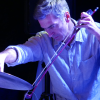
Yorgos Dimitriadis
drums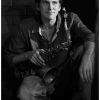
Robin Fincker
woodwinds
Daniel Erdmann
saxophone
Jim Hart
vibraphone
Anil Eraslan
cellob.1981
If a European country wants to present and promote its musicians in another European country it is an obvious and natural approach to go to that country and match and combine musicians from both countries to foster enduring exchange and artistic development. That is what Jazzdor has done for the past 12 years. Other countries have different, often unilateral approaches or leave it to the musicians themselves to join forces and collaborate. It is a mystery why France still is the only country consequently following the bilateral route. My impression is that this and other measures actually facilitate access of French musicians to foreign audiences, labels and collaborations with musicians in other countries and consequently becoming a known or even popular name. Germany, but also Eastern European countries, clearly show that. On the other hand, you can see that for example musicians from Eastern Europe migrate(d) to France and asserted themselves on the French scene.
An event such as Jazzdor Berlin is embedded in a larger interlocking supportive infrastructure, as the part Jazz Migration, which was created in 2002 for young upcoming musicians and groups. Every year Jazz Migration chooses four units to give training to in order to help build their career nationally and internationally, and to support them by organizing concerts in venues and at festivals (about 10 for each unit). The yearly chosen units are also adopted by a major venue or festival.
Participation at events like Jazzdor Berlin is one of the possibilities. This year two of the four selected groups, Ikui Doki and Novembre, participated in Jazzdor Berlin to give them international exposure. Ikui Doki is adopted by Paris Jazz Festival and the group Novembre by festival Banlieue Bleu.
Conspicuously some of the musicians of the two groups have performed earlier at Jazzdor Berlin (cumulative effect). In that context, and with its long-term approach, Jazzdor can be considered a breeding ground for the artistic growth of young-up-and-coming as well as for established musicians and groups (see also my review of Jazzdor 2017 Strasbourg).
Reach in/reach out
The other eight units went with their music along a couple of different trails. They reworked folk music sources (Bedmakers, Michel Portal 5), played energizing straight ahead (Fran?ois Corneloup Quintet), worked round spurt and slowing down (Roberto Negro DaDaDa), dealt with heavy real time creation (Dimitriades/Lemoine/Parkins) and did their thing with playfully orchestrating particles and giving it transient shape (Pablo Held Trio, Novembre).Pianist Roberto Negro's DaDaDa unit with the unbeatable ?mile Parisien and the forcefully beating, as well as subtly rustling and soughing, Michele Rabbia opened, set the standard, fired things up and triggered the next group, The Michel Portal Quintet. Bass clarinetist Michel Portal (1935) is (still) a driving force in the French jazz/music scene and the most prominent one on his instrument together with

Louis Sclavis
woodwindsb.1953

Vincent Peirani
accordionb.1980
Lander Gyselinck
drumsNext night was opened by renowned trio of pianist Pablo Held (1986) bassist Robert Landfermann and drummer Jonas Burgwinkel from Cologne. Underway now for more than ten years, with ten albums on its sleeve, it is one of the most solid younger piano trios in Europe (see my review here). With its last album Investigations they made their debut for UK-based label Edition Records. The trio that regularly joins forces with electric guitarist

John Scofield
guitarb.1951

Ralph Towner
guitarb.1940
What If, the quartet of French up-and-coming saxophonist Hugues Mayot, comprising unmistakable keyboard wizard Jozef Dumoulin, bassist Joachim Florent and drummer
Franck Vaillant
drumsThe performance of drummer

Yorgos Dimitriadis
drumsWho are these musicians and what brought these three musicians together to play at Jazzdor Berlin? Greek drummer Yorgos Dimitriadis and French saxophonist Philippe Lemoine are both active members of the Berlin impro-scene. Lemoine also works in Marseille and Dimitriadis worked for more than a decade in Paris. Lemoine has been a member of Orchestre National du Jazz under the direction of
Claude Barthelemy
b.1956Jazzdor's last night in Berlin started with Novembre, a new young French quartet consisting of saxophonist
Antonin-Tri Hoang
saxophone, alto
Charlotte Greve
saxophone, altoThe Bedmakers played in a line-up of French-English saxophonist

Robin Fincker
woodwinds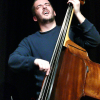
Dave Kane
bass
Pascal Niggenkemper
bass, acoustic
Mat Maneri
violab.1969

Barre Phillips
bassb.1934

Paul Dunmall
saxophoneb.1953
The final concert was renowned French baritone saxophonist Fran?ois Corneloupe with his all French quintet comprising trombonist Simon Girard, pianist

Sophia Domancich
pianob.1957
Claude Tchamitchian
bass, acoustic
Henri Texier
bassb.1945
Conclusion
Jazzdor Berlin again provided valuable insights in artistic development of young-and-upcoming musicians/groups, in new concepts/approaches and new perspectival collaborations. However, to maintain Jazzdor's attraction, relevance and impact it will be necessary and important in the near future to present it in a sharper and more appealing manner in the Berlin context with its plenitude of musical events in the same vein.Tags
Live Reviews
Henning Bolte
Germany
Berlin
Sophie Bernardo
Airelle Besson
Silke Eberhard
Andrea Parkins
Rafa?lle Rinaudo
Roberto Negro
Francois Corneloup
Sophie Bernado
Hugues Mayot
Eve Risser
Fanny Lasfargue
Sebastian Sternal
Jonas Burgwinkel
Ricardo del Fra
Hans L©╣demann
Ronny Graupe
Dejan Terzic
Th©”o Ceccaldi
Yves Robert
Julien Pontvianne
Sebastien Boisseau
Alexandra Grimal
Joachim K©╣hn
Michele Rabbia
Nils Wogram
Lander Gyselinck
Jozef Dumoulin
Pablo Held
Robert Landfermann
Yorgos Dimitriadis
Robin Fincke
Daniel Erdmann
Jim Hart
Anil Eraslan
Louis Sclavis
Vincent Peirani
Lander Gyselinck
Bruno Chevillon
John Scofield
Ralph Towner
Joachim Florent
Franck Vaillant
Philippe Lemoine
Claude Barth©”lemy
Antonin Tri Hoang
Romain Clerc-Renaud
Thibault Cellier
Elie Duris
Charlotte Greve
Robin Fincker
Mathieu Werchowski
Dave Kane
Pascal Niggenkemper
Fabien Duscombs
Mat Maneri
Barre Phillips
Paul Dunmall
Fran?ois Corneloupe
Simon Girard
Sophia Domancich
Vincent Tortiller
Claude Tchamitchian
Henri Texier
Francois Raulin
Sylvain Kassap
Comments
PREVIOUS / NEXT
Support All About Jazz
 All About Jazz has been a pillar of jazz since 1995, championing it as an art form and, more importantly, supporting the musicians who make it. Our enduring commitment has made "AAJ" one of the most culturally important websites of its kind, read by hundreds of thousands of fans, musicians and industry figures every month.
All About Jazz has been a pillar of jazz since 1995, championing it as an art form and, more importantly, supporting the musicians who make it. Our enduring commitment has made "AAJ" one of the most culturally important websites of its kind, read by hundreds of thousands of fans, musicians and industry figures every month.
Go Ad Free!
To maintain our platform while developing new means to foster jazz discovery and connectivity, we need your help. You can become a sustaining member for as little as $20 and in return, we'll immediately hide those pesky ads plus provide access to future articles for a full year. This winning combination vastly improves your AAJ experience and allow us to vigorously build on the pioneering work we first started in 1995. So enjoy an ad-free AAJ experience and help us remain a positive beacon for jazz by making a donation today.

Berlin
Concert Guide | Venue Guide | Local Businesses
| More...
Berlin Concerts
Sep
17
Wed

Vortex
PANDA Platforma
Berlin, Germany
Sep
18
Thu
Surprise Chef
Lido
Berlin, Germany
Sep
19
Fri
Meissner Breu Schröder Sundland
Peppi Guggenheim
Berlin, Germany
Sep
20
Sat

Bons Baisers De Paris - French Swing Jazz
Institut Français Berlin
Berlin, Germany
Sep
21
Sun
Faraj Live in Berlin
Huxleys Neue Welt
Berlin, Germany
Sep
24
Wed
Gulf Of Berlin
PANDA Platforma
Berlin, Germany
Sep
26
Fri
Stream
Nuva
Peppi Guggenheim
Berlin, Germany
Sep
27
Sat
Natalia Rose - Jazz Quartet
Peppi Guggenheim
Berlin, Germany
Sep
29
Mon
GeeJay
Privatclub
Berlin, Germany
Sep
30
Tue
Berlin
Gretchen
Berlin, Germany

Berlin
Concert Guide | Venue Guide | Local Businesses | More...
Sep
17
Wed

Vortex
PANDA PlatformaBerlin, Germany
Sep
18
Thu
Surprise Chef
LidoBerlin, Germany
Sep
19
Fri
Meissner Breu Schröder Sundland
Peppi GuggenheimBerlin, Germany
Sep
20
Sat

Bons Baisers De Paris - French Swing Jazz
Institut Français BerlinBerlin, Germany
Sep
21
Sun
Faraj Live in Berlin
Huxleys Neue WeltBerlin, Germany
Sep
24
Wed
Gulf Of Berlin
PANDA PlatformaBerlin, Germany
Sep
26
Fri
Stream
Nuva
Peppi GuggenheimBerlin, Germany
Sep
27
Sat
Natalia Rose - Jazz Quartet
Peppi GuggenheimBerlin, Germany
Sep
29
Mon
GeeJay
PrivatclubBerlin, Germany
Sep
30
Tue
Berlin
GretchenBerlin, Germany


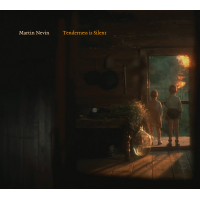
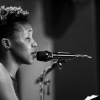

 Buy Now
Buy Now




